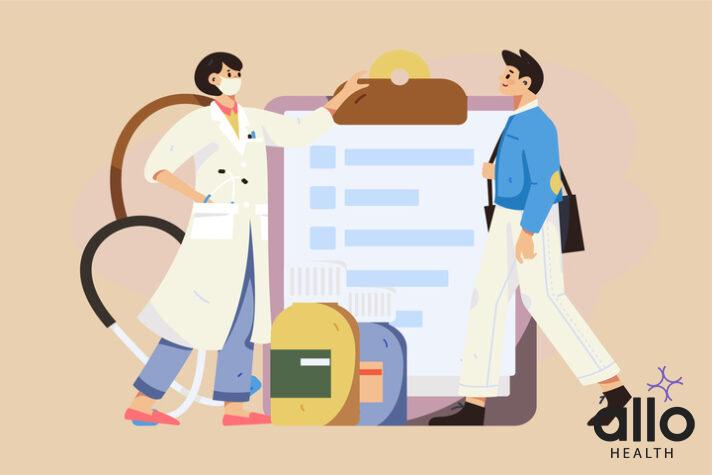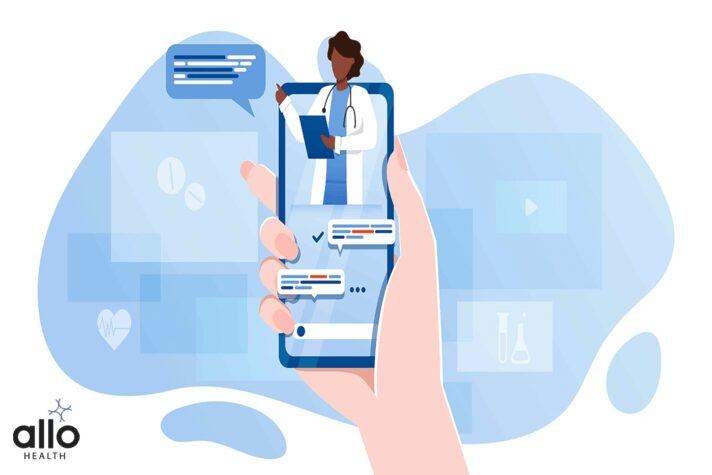Can Low Testosterone Levels Lead to Premature Ejaculation?

Allo Health is dedicated to personalized well-being, offering support and trusted information tailored to individual health goals. The platform emphasizes human-generated content, led by a distinguished medical team of experts, including physicians and sexual health specialists. Their commitment to credibility involves rigorous fact-checking, authoritative research, and continuous updates to ensure accurate, up-to-date information. Allo Health's unique approach goes beyond conventional platforms, providing expert-led insights and a continuous commitment to excellence, with user feedback playing a crucial role in shaping the platform's authoritative voice.

Dr Sanina Mansoor holds MBBS degree from Yenepoya university,Mangalore.She has 8 years of experience working as a medical officer at various health centres and medical colleges.
Why This Was Upated?
Our experts continually monitor the health and wellness space, and we update our articles when new information became available.
Updated on 06 February, 2024
- Article was updated as part of our commitment to diversity, equity, and inclusion.

"The following blog article provides general information and insights on various topics. However, it is important to note that the information presented is not intended as professional advice in any specific field or area. The content of this blog is for general educational and informational purposes only.
Book consultation
The content should not be interpreted as endorsement, recommendation, or guarantee of any product, service, or information mentioned. Readers are solely responsible for the decisions and actions they take based on the information provided in this blog. It is essential to exercise individual judgment, critical thinking, and personal responsibility when applying or implementing any information or suggestions discussed in the blog."
According to a recent study, low testosterone levels can contribute to premature ejaculation (PE). PE is a common sexual disorder that affects many men around the world. It is a condition where a man experiences ejaculation earlier than desired during sexual activity, causing distress and frustration for both partners.
Causes Of Low Testosterone Levels
Low testosterone levels, also known as hypogonadism, can be caused by various factors, and they can affect men of different ages. Testosterone is a crucial hormone for the development and maintenance of male characteristics, including muscle mass, bone density, libido, and overall well-being. Here are some detailed causes of low testosterone levels:
- Age: As men age, there is a natural decline in testosterone levels. This is known as andropause or male menopause. However, not all men will experience significant symptoms, and the decline varies from person to person.
- Hormonal Disorders: Certain hormonal disorders can disrupt the normal production of testosterone. Conditions such as hypothyroidism (underactive thyroid) and hyperprolactinemia (elevated levels of prolactin) can impact testosterone production.
- Hypothalamic or Pituitary Disorders: The hypothalamus and pituitary gland play a crucial role in regulating testosterone production. Tumors or dysfunction in these areas can lead to decreased stimulation of the testes to produce testosterone.
- Testicular Disorders: Conditions affecting the testicles, such as injury, infection, or the presence of tumors, can impair testosterone production. Klinefelter syndrome, a genetic disorder where a male is born with an extra X chromosome, can also result in low testosterone.
- Chronic Illness: Chronic medical conditions like diabetes, kidney disease, liver disease, and HIV/AIDS can contribute to low testosterone levels. The chronic inflammation associated with these conditions can affect the functioning of the testes.
- Obesity: Excess body weight, especially abdominal fat, has been linked to lower testosterone levels. Obesity is associated with increased conversion of testosterone into estrogen, a phenomenon known as aromatization.
- Medications: Certain medications can interfere with testosterone production. These may include corticosteroids, opioids, and some medications used to treat prostate cancer.
- Lifestyle Factors: Unhealthy lifestyle choices, such as excessive alcohol consumption, smoking, and a sedentary lifestyle, can contribute to low testosterone levels. Lack of exercise and poor dietary habits may also play a role.
- Sleep Apnea: Sleep apnea, a disorder where breathing is repeatedly interrupted during sleep, has been associated with lower testosterone levels. The disruption in sleep patterns can negatively impact hormone production.
- Stress and Mental Health: Chronic stress and mental health conditions like depression can influence hormonal balance, including testosterone levels. Elevated stress hormones, such as cortisol, may contribute to lower testosterone.
- Genetic Factors: Some individuals may have a genetic predisposition to lower testosterone levels. Family history and genetics can play a role in hormonal health.
It’s important to note that experiencing some decline in testosterone levels with age is normal, but significant or abrupt decreases may warrant medical attention. If an individual suspects they have low testosterone, consulting with a healthcare professional is essential for proper evaluation and management. Treatment options may include lifestyle changes, hormone replacement therapy, or addressing underlying medical conditions.
Symptoms Of Low Testosterone Levels
Low testosterone levels, or hypogonadism, can manifest with various symptoms. It’s important to note that the severity and combination of symptoms can vary from person to person. Additionally, some symptoms may be subtle and attributed to other factors, so a healthcare professional’s evaluation is crucial. Here are detailed symptoms associated with low testosterone levels:
- Sexual Dysfunction:
- Reduced Libido (Sex Drive): A decrease in sexual desire is a common symptom of low testosterone. Men may experience a diminished interest in sexual activities.
- Erectile Dysfunction: Low testosterone levels can contribute to difficulties in achieving and maintaining erections. It may also result in a decrease in the quality of erections.
- Changes in Sleep Patterns: Insomnia or disrupted sleep patterns may occur. Some individuals with low testosterone levels may experience difficulty falling asleep or staying asleep throughout the night.
- Physical Changes:
- Reduced Muscle Mass: Testosterone plays a role in the development and maintenance of muscle mass. Low levels can contribute to a decrease in muscle mass and strength.
- Increased Body Fat: Conversely, low testosterone is associated with an increase in body fat, particularly around the abdomen.
- Decreased Bone Density: Testosterone is essential for maintaining bone health. Low levels can lead to a decrease in bone density, potentially increasing the risk of fractures.
- Fatigue and Decreased Energy Levels: Individuals with low testosterone may experience persistent fatigue, a general lack of energy, and reduced stamina. Tasks that were once easy may become more challenging.
- Mood Changes:
- Irritability: Low testosterone levels can contribute to irritability, mood swings, and a general sense of unease.
- Depression: While not solely attributed to low testosterone, some men with low levels may experience symptoms of depression.
- Cognitive Changes:
- Difficulty Concentrating: Some individuals may notice a decline in cognitive abilities, including difficulties with concentration and memory.
- Reduced Body Hair: Testosterone contributes to the growth of body hair, and low levels may result in a reduction in the thickness and quantity of body hair.
- Hot Flashes and Sweating: Some men with low testosterone may experience hot flashes and increased sweating, similar to symptoms seen in menopausal women.
- Gynecomastia (Enlarged Breasts): A decrease in testosterone relative to estrogen levels may lead to the development of gynecomastia, characterized by the enlargement of breast tissue in men.
- Decreased Testicle Size: Low testosterone levels can contribute to a reduction in the size of the testicles.
- Infertility: Reduced sperm production can result from low testosterone levels, leading to fertility concerns.

It’s important to recognize that these symptoms can also be associated with other medical conditions, and a healthcare professional’s evaluation is necessary for an accurate diagnosis. If someone is experiencing symptoms of low testosterone, seeking medical advice is crucial for appropriate testing and potential treatment options. Hormone replacement therapy may be considered if low testosterone is confirmed and significantly impacting an individual’s quality of life.
Treating Low Testosterone Levels
Treating low testosterone levels involves addressing the underlying cause and, in some cases, providing testosterone replacement therapy (TRT). The approach to treatment will depend on the severity of symptoms, the individual’s overall health, and the specific underlying causes. Here are detailed aspects of treating low testosterone levels:
- Identifying and Addressing Underlying Causes: Before initiating testosterone replacement therapy, healthcare professionals will investigate and address any underlying causes contributing to low testosterone. This may involve treating hormonal disorders, addressing chronic illnesses, or modifying lifestyle factors such as obesity, poor nutrition, or lack of exercise.
- Lifestyle Modifications: Adopting a healthy lifestyle can contribute to optimizing testosterone levels naturally. This includes maintaining a balanced diet, engaging in regular exercise, managing stress, getting adequate sleep, and avoiding excessive alcohol consumption and smoking.
- Testosterone Replacement Therapy (TRT): When low testosterone levels persist and significantly impact an individual’s quality of life, testosterone replacement therapy may be considered. TRT aims to restore testosterone levels to within the normal range.
- Forms of Testosterone Replacement Therapy:
- Intramuscular Injections: Testosterone can be administered via intramuscular injections, typically given every 1-2 weeks. This method provides a sustained release of testosterone.
- Transdermal Patches or Gels: Patches or gels containing testosterone can be applied to the skin, allowing for absorption into the bloodstream. This method provides a more continuous release of testosterone.
- Topical Creams: Testosterone creams are applied to the skin, usually on the shoulders or upper arms, and absorbed into the bloodstream.
- Subcutaneous Pellets: Small pellets containing testosterone are implanted under the skin, releasing a steady and consistent amount of the hormone over several months.
- Monitoring and Adjusting Treatment: Regular monitoring of testosterone levels and overall health is essential during TRT. Adjustments to the treatment plan may be made based on the individual’s response, ensuring that testosterone levels remain within the normal range.
- Potential Side Effects and Risks: Testosterone replacement therapy may be associated with potential side effects, including acne, fluid retention, increased red blood cell count, and, in some cases, an increased risk of cardiovascular concerns. Regular monitoring and consultation with a healthcare professional are crucial to managing these potential risks.
- Fertility Considerations: TRT can suppress sperm production, leading to infertility in some men. For those concerned about fertility, alternative treatments or a combination of therapies may be considered. Consultation with a reproductive specialist is recommended for individuals planning to have children.
- Individualized Treatment Plans: Treatment plans for low testosterone levels should be individualized based on the patient’s health, preferences, and response to therapy. Healthcare professionals consider factors such as age, overall health, and the presence of other medical conditions when determining the most suitable approach.
It’s essential for individuals with symptoms of low testosterone to consult with a healthcare professional for a comprehensive evaluation and personalized treatment plan. Self-diagnosis and self-treatment can lead to complications, and only a qualified healthcare provider can determine the most appropriate course of action based on thorough assessment and monitoring.
Can Low Testosterone Levels Lead to Premature Ejaculation?
The relationship between low testosterone levels and premature ejaculation is not as straightforward as some other sexual health concerns. Premature ejaculation is a common sexual dysfunction characterized by ejaculating sooner than desired, often with minimal sexual stimulation. While testosterone does play a role in sexual function, including libido and erectile function, its direct influence on premature ejaculation is not well-established. However, there are some potential indirect connections:
- Libido and Arousal: Testosterone is a key hormone that influences libido, or sexual desire. If low testosterone levels lead to a reduced libido, it might result in less sexual arousal and excitement, potentially contributing to difficulties in controlling ejaculation.
- Erectile Function: Testosterone is involved in maintaining erectile function. If low testosterone levels contribute to erectile dysfunction, a man may experience anxiety or a sense of urgency during sexual activity, possibly leading to premature ejaculation.
- Psychological Factors: Low testosterone levels can sometimes be associated with mood changes, including increased irritability and decreased motivation. Psychological factors, such as stress, anxiety, or depression, can contribute to premature ejaculation. These factors may be influenced by hormonal imbalances.
- Body Composition Changes: Obesity, often associated with lower testosterone levels, may contribute to overall health concerns, including cardiovascular problems. Poor cardiovascular health is linked to sexual dysfunction, and it may indirectly contribute to premature ejaculation.
- Hormonal Imbalance: Hormonal imbalances, including low testosterone, can disrupt the delicate interplay of hormones involved in sexual function. While testosterone is not the only hormone influencing sexual health, its imbalance can potentially contribute to various sexual dysfunctions, including premature ejaculation.
It’s important to note that premature ejaculation is a multifactorial concern, and psychological, interpersonal, and physiological factors all play a role. If someone is experiencing premature ejaculation or other sexual concerns, a comprehensive evaluation by a healthcare professional, including a urologist or sexual health specialist, is recommended. The healthcare provider will consider various factors, including hormonal levels, to determine the most appropriate approach to diagnosis and treatment.

Treatment options for premature ejaculation may include behavioral therapies, psychological counseling, topical anesthetics, and, in some cases, medications. If low testosterone is identified as part of the concern, addressing the underlying hormonal imbalance through hormone replacement therapy may be considered. However, this should only be done under the guidance of a qualified healthcare professional due to potential risks and side effects associated with hormone replacement therapy.
Most Asked Questions
-
Can low testosterone cause premature ejaculation?
Low testosterone alone isn't always an instantaneous reason of untimely ejaculation, however it is able to make contributions indirectly. Testosterone impacts libido and arousal, and a decrease in these elements may additionally result in difficulties in controlling ejaculation. Additionally, hormonal imbalances can disrupt the delicate interaction of hormones concerned in sexual feature, potentially gambling a position in untimely ejaculation.
-
How does low testosterone affect sexual arousal and overall performance?
Low testosterone can lessen libido, impacting sexual arousal. It may additionally contribute to erectile dysfunction, inflicting tension at some stage in sexual hobby. These elements, encouraged with the aid of hormonal imbalances, can not directly have an effect on untimely ejaculation through altering the overall sexual experience and reaction.
-
Is premature ejaculation basically a hormonal difficulty?
No, untimely ejaculation is a complex trouble with multiple elements, which include psychological, interpersonal, and physiological elements. While hormonal imbalances, such as low testosterone, can make a contribution, addressing premature ejaculation regularly calls for a complete technique that considers various factors of sexual fitness and properly-being.
-
Can addressing low testosterone ranges enhance premature ejaculation?
Addressing low testosterone degrees might also have high-quality effects on basic sexual health, potentially improving libido and erectile function. However, the effect on premature ejaculation is indirect. Treatment for untimely ejaculation often entails behavioral cures, counseling, and from time to time medications, relying on the precise elements contributing to the condition.
-
Should I seek clinical recommendation for premature ejaculation associated with low testosterone?
Yes, consulting a healthcare professional, which includes a urologist or sexual fitness professional, is beneficial in case you are experiencing premature ejaculation or related worries. A complete evaluation will help become aware of contributing elements, consisting of hormonal stages, and manual appropriate treatment options tailored on your unique state of affairs.






































